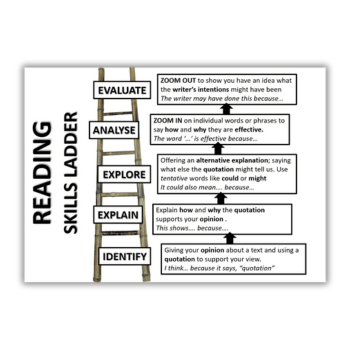This PowerPoint for KS4 English sets out a structured taxonomy designed to help students develop essential reading and analytical skills.
It provides a step-by-step approach, guiding learners from basic comprehension to sophisticated textual analysis.
For KS4 English teachers, this ladder can be an invaluable tool to scaffold students’ reading proficiency progressively.
Key reading skills in the ladder
- Identify: The first step focuses on students identifying their opinion on a text and supporting it with evidence. Teachers can encourage students to form initial opinions by teaching them to select and cite relevant quotations from the text, such as, “I think… because it says, ‘quotation.’”
- Explain: This stage develops students’ ability to articulate how and why the quotation supports their views. Teachers should prompt students to elaborate, using sentence frames like, “This shows… because…”, helping them connect evidence to reasoning.
- Explore: Here, students are encouraged to offer alternative explanations for quotations using tentative language such as “could” or “might.” For example, students might say, “It could also mean… because…” This encourages critical thinking and openness to multiple interpretations.
- Analyse: At this level, students are guided to zoom in on individual words or phrases, discussing their significance and effectiveness. Teachers can help students break down the connotations of specific language choices, e.g., “The word ‘…’ is effective because…”.
- Evaluate: Finally, students are prompted to zoom out and evaluate the broader intentions of the writer. Teachers can ask students to consider the writer’s purpose, e.g., “The writer may have done this because…”, thus fostering a deeper understanding of the text’s context and intention.
By incorporating this ladder into your lessons, you can foster a gradual but meaningful development of reading and interpretative skills, preparing students for both exams and broader critical engagement with literature.
David Didau is an independent education consultant and writer. He blogs at learningspy.co.uk and you can follow him on X at @DavidDidau.














